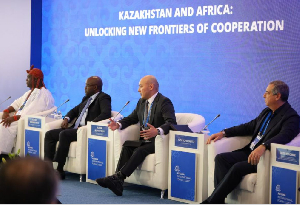 Kazakhstan and African countries are steadily building closer relations
Kazakhstan and African countries are steadily building closer relations
Kazakhstan and African countries are steadily building closer relations despite the distance between them. Recent high-level visits show both sides are committed to deepening partnerships in trade, technology, and agriculture.
Rwanda’s President Paul Kagame made his second visit to Kazakhstan since 2015. During his trip, he highlighted the strong friendship between the two nations and their shared interest in learning from each other’s experiences.
Kagame also spoke at the Astana International Forum, where he pointed to cooperation on critical minerals as a key area of mutual benefit.
The forum attracted other African leaders, including Nigeria’s King Ife Oba Adeyeye Enitan Ogunwusi, a special envoy from Congo, and Burkina Faso’s former prime minister. Astana will host Burkina Faso’s Foreign Minister in early June to continue diplomatic talks.
Kazakhstan’s Foreign Ministry has identified Africa as a growing priority. A new strategy to guide cooperation with African states and the African Union from 2025 to 2030 is underway.
This effort supports Kazakhstan’s multi-vector foreign policy, which aims to build diverse global partnerships.
In recent years, Kazakhstan has welcomed leaders from Togo, Congo, Guinea-Bissau, Sierra Leone, Benin, and Rwanda.
In February 2025, Kazakhstan’s Deputy Prime Minister and Foreign Minister visited Morocco, marking the first official trip by a top Kazakh official to Africa.
Kazakhstan’s diplomatic presence in Africa has expanded from one mission in 2012 to six in 2025. Trade between Kazakhstan and African countries grew from about $100 million in 2012 to more than $1 billion in 2022, though it slightly decreased to $783 million in 2024. Key exports include sulfur, petroleum coke, metal products, agricultural goods, and fertilizers.
Kazakhstan imports fruits, coffee, pharmaceuticals, textiles, cosmetics, and electrical equipment from Africa.
Where formal diplomatic missions do not exist, Kazakhstan relies on honorary consuls to promote business ties. Since 2013, Kazakhstan has held observer status with the African Union and strengthened ties through multilateral cooperation.
African nations represent a significant voting bloc at the United Nations and increasingly influence global decisions. Kazakhstan views Africa as an equal partner committed to sustainable development and a fair international system.
The forum attracted other African leaders, including Nigeria’s King Ife Oba Adeyeye Enitan Ogunwusi, a special envoy from Congo, and Burkina Faso’s former prime minister. Astana will host Burkina Faso’s Foreign Minister in early June to continue diplomatic talks.
Kazakhstan’s Foreign Ministry has identified Africa as a growing priority. A new strategy to guide cooperation with African states and the African Union from 2025 to 2030 is underway.
This effort supports Kazakhstan’s multi-vector foreign policy, which aims to build diverse global partnerships.
In recent years, Kazakhstan has welcomed leaders from Togo, Congo, Guinea-Bissau, Sierra Leone, Benin, and Rwanda.
In February 2025, Kazakhstan’s Deputy Prime Minister and Foreign Minister visited Morocco, marking the first official trip by a top Kazakh official to Africa.
Kazakhstan’s diplomatic presence in Africa has expanded from one mission in 2012 to six in 2025. Trade between Kazakhstan and African countries grew from about $100 million in 2012 to more than $1 billion in 2022, though it slightly decreased to $783 million in 2024. Key exports include sulfur, petroleum coke, metal products, agricultural goods, and fertilizers.
Kazakhstan imports fruits, coffee, pharmaceuticals, textiles, cosmetics, and electrical equipment from Africa.
Where formal diplomatic missions do not exist, Kazakhstan relies on honorary consuls to promote business ties. Since 2013, Kazakhstan has held observer status with the African Union and strengthened ties through multilateral cooperation.
African nations represent a significant voting bloc at the United Nations and increasingly influence global decisions. Kazakhstan views Africa as an equal partner committed to sustainable development and a fair international system.
